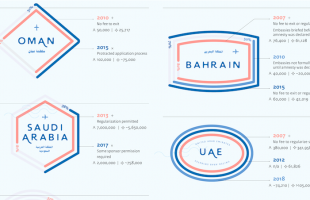Historically, minorities tend to bear the blame for society's ills. Xenophobia against migrants in the Gulf is a widespread yet contradictory phenomena. These accusations against migrants are undergirded by assumptions and purposefully misconstrued facts. This recent feature published in Arab News embodies the xenophobic and racist fallacies that perpetuate misconceptions of migrant workers. The article claims "it's worrying" that Arab expatriates are falling as compared to Asian expatiates. The author cites security and an "erosion of social values" as the rationale for his disconcertion.
The notion that Asian migrants somehow represent security risk unique from Arab migrants is logically unsound. The article is very ambiguous as to what threat non-Arab migrants pose, particularly given that their presence is monitored by the government. If the author is referring to trafficked migrants, who are undocumented, than the fault lies in the government's inability to thwart traffickers - who themselves present a greater threat than migrants. If the author is referring to absconded migrants, who are similarly considered undocumented, than once again the issue lies not with migrants themselves but in the primary reasons for absconsion - abuse or exploitation by employers. If he is simply referring to crimes committed by migrant workers, those too are overwhelmingly linked to employer mistreatment.
Furthermore, most Gulf employers appear to prefer non-Arab migrants. This is most likely due to cost, as Asian (and African) workers tend to require a lower salary, though migrants from certain countries are also perceived to hold a more desired skill-set.
The author continues to posit ungrounded claims against migrants that have much more to do with administrative mismanagement than migrants themselves. The author bemoans the detrimental affect of migrant workers on "planned utilities." Had the utilities been properly planned, they would take into account the migrants who have been in a fixture in the Gulf for over a decade and who will continue to function as the country's primary labor force. Why should migrants be culpable for the government's lack of foresight?
The suggestion that non-Arab migrants comprise a morally-destructive social force is similarly unsubstantiated. Many migrants live relatively isolated from the wider population. There is little opportunity for their presumptively moral depravity to affect Gulf societies at large. Migrants are castigated for their refusal to integrate with local values - and yet, they live on the fringes of societies, are rejected from some public places, and - if they are domestic workers - rarely enjoy the chance to leave their residence and intermingle with society. What opportunity are migrants offered for integration, let alone interaction? In general, they are not embraced by society as compatriots, but merely tolerated. Nonetheless, several migrant-sending countries have developed programs to help acclimate migrants to their host country's environment,and Gulf nations' highly enforced moral laws ensure the migrants abide by social norms.
Regardless, how can it be determined whether such a diverse group's values are inferior to those of the local population? Crimes committed against employers are often cited as evidence of migrants' categorical immorality. Yet if the actions of a few individuals can be extrapolated to the character of an entire socio-economic group, than the actions of abusive and exploitative employers must similarly reflect the values of the local population. In such a case, the two would share the same moral ground.
Notably, statistics pertaining to migrant crime rates, which are quite inaccessible, are rarely cited in these denigrations. Instead, authors rely upon entirely anecdotal data. However, this "data" is heavily skewed, as migrant crime receives inordinate media coverage.
The author further attempts to support his disparagement of migrant workers by fallaciously comparing Gulf migrants to U.S. migrants, whom he claims have successfully adapted to the local culture. However, the author does not clarify which migrants he is referring to; many migrants in the U.S. are permanent immigrants, who have "integrated" over time. In contrast, migrants in the Gulf do not have the same long-term motivation to fully adapt Gulf cultures. They are perpetually reminded of their transient and subordinate status, particularly in the sustained denial of their labor rights. It is contradictory to deny migrants the same rights as locals while expecting them to emulate local culture.
The misperceptions fueled by false and vitriolic articles justify the social and legal subordination of migrant workers. Media publishers must take responsibility for such libel, which contributes to a discomfiting social atmosphere for migrants. Similarly, public officials must be held acceptable for their blanket incriminations of migrant workers, which often function to deflect responsibility from some administrative failure.




